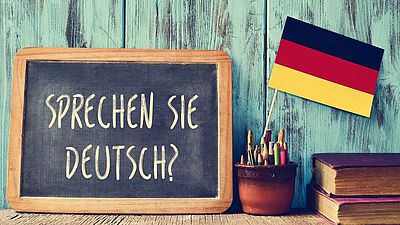
Vocational training in the hotel and gastronomy industry in Germany
Learn a future-proof profession in the hotel and gastronomy industry (HoGa) in Germany. Here you will find information on the vocational training, professions in demand and the prospects.
On this page
- Hotel and gastronomy industry: prospects for skilled workers
- In-demand vocational training professions in the gastronomy and hotel industry
- Where can I complete vocational training?
- How much do I earn during vocational training?
- Which requirements do I have to meet?
- Prospects after vocational training
Vocational training in the hotel and gastronomy industry (HoGa) offers not only diverse career opportunities but also an exciting way of starting your professional life in Germany. Learn more about potential careers in the industry and find the vocational training place suitable for you.
Hotel and gastronomy industry: prospects for skilled workers
The hotel and gastronomy sector offers a wide range of professions that focus on interacting with people: welcoming guests in a hotel, impressing them with your cooking skills or working on standardised processes in system catering – there are numerous opportunities. The professions have many facets and are challenging in many ways. Flexibility, communication skills and proper organisation are particularly important here to ensure that everything runs smoothly and guests are satisfied.
In-demand vocational training professions in the gastronomy and hotel industry
The most important professions in the dual vocational training system are the following (unfortunately, the following links are only available in German. We recommend using a translation tool):
- Specialist in gastronomy
- Specialist in restaurants and event catering
- Professional caterer
- Specialist in the hotel business
- Cook
- Skilled kitchen employee
- Hotel management clerk
In addition to that, there are solely school-based vocational training programmes in the hotel and gastronomy sector.
Each of these professions have their own focus, for example cooking, restaurant service or advising guests. Depending on the profession, vocational training takes 2 to 3 years to complete.

International Apprentices in Hospitality and Gastronomy
It's really about attracting new generations. And you have to train far more people than can later be employed long-term, because there is always natural turnover.
My name is Denny Amrhein and I run a family-owned hotel here. We are the fifth generation. I've been managing it for almost 20 years, I am also the owner and I still enjoy my work every day. We have about 85 employees across the two locations, and now more apprentices than ever, currently 23. And of those 23, seven come from non-EU countries. We are in the fortunate position of not having a shortage of skilled staff.
We also receive many applications directly from local schools. And we complement that with apprentices from third countries, because it's simply a good mix. It's truly enriching.
My name is Gautam, I am 25 years old, I am from Nepal and I am training as a specialist in restaurant and event catering. At work I have to speak German and I enjoy doing it, because when I speak German with guests I can learn something new. It was hard at first, yes.
I am Pascaline. I am from Togo and I am doing my training at Fuchsbräu. For me, cooking is something special. It can be a bit tiring, but I have learned a lot, I have met many people. I feel very comfortable here.
I am Ariatou and I am a cook. I work with my cousin at Fuchsbräu. Cooking, for me, is my life. I forget my problems, everything. I am in the kitchen, I cook for someone. Then someone eats and says: "Your food was good, delicious. Thanks, Ari!" It's that simple!
Starting out when new people arrive is naturally difficult, because the language is not fully mastered yet. But after six months, they relax enough to work really well together. They watch the work and just by observing, they copy immediately what we show them. Perfect.
At some point we noticed they did not speak enough German. So I quickly said: we need an internal German course, which we organize ourselves, and I knew the teacher. The motivation is high. They know that the course helps them work better, collaborate better, and improve the workplace atmosphere.
Week by week it was noticeable how they improved in grammar, pronunciation and also in how they communicate with each other.
My team is very helpful and when I don't understand something, they all help me and are very friendly. I also wanted to work professionally, and that is my goal: to gain as much experience as possible.
A future in my home country? No, I don't have one. But here in Germany I do have a future: I can work, I can earn money. Here I can do everything. The path of bringing in apprentices from third countries is really good. And we will surely continue doing it.
New apprentices are already being considered for next year, also relatives and acquaintances of current apprentices. It really is a good path for us, and we see that they are all very loyal and will probably stay after training. This way we secure our skilled staff for the coming years.
I can only recommend to our colleagues to try it too, to be open to the possibility of attracting apprentices from third countries. And here in Bavaria there is the ZSEF, which is really very helpful, offering a lot of support, and with the accelerated procedure for skilled worker immigration everything is completed within a reasonable timeframe. You just have to try it. That's what I would really advise everyone. You can only gain. What do you lose if you don't try?
Video: Building a Career as an Apprentice in Hospitality and Gastronomy
Where can I complete vocational training?
In the hotel and gastronomy industry, there are many options for completing vocational training. It generally takes place within the dual system. This means that you learn the practical work in a company and go to vocational school for the theoretical part. Learn more about this topic in our “Dual vocational training” section.
Common employers (for dual vocational training) are the following:
- Hotels
- Restaurants and cafés
- Catering companies
- Cruise ships
- Restaurant chains (fast food, cafés, franchise companies)
If you complete solely school-based vocational training, you will learn everything at vocational school. In this case, you will not be remunerated; you will have to finance your vocational training yourself.
How much do I earn during vocational training?
In Germany, there is a statutory minimum training allowance of €724 (as of 2026) for all professions. Here is a rough estimate of how much you can expect to earn during vocational training in the hotel and gastronomy industry:
- Specialist in gastronomy: €950 – €1,200 per month (gross income)
- Specialist in restaurants and event catering: €983 – €1,200 per month (gross income)
- Hotel management clerk: €950 – €1,200 per month (gross income)
You should also know the following:
- You have to pay social security contributions from your gross income, for example for statutory heal insurance, pension insurance and unemployment insurance. These contributions are deducted automatically, before you receive your net income in your bank account.
- During vocational training, you only pay income tax if you have a higher gross income than €1,430 per month (in tax bracket I; as of 2026).
- In this sector, working in shifts is a possibility, however, this is generally remunerated by bonuses.
- Receiving tips is also possible, for example when working in restaurants.
What are determining factors for the training allowance?
The training allowance may depend on…
- …the region in Germany, where you are trained.
- …the company in which you are trained.
- …the training year you are currently in. The allowance increases with each training year.
Which requirements do I have to meet?
For vocational training, you generally require a school-leaving certificate. In the case of vocational training in the dual system, you do not need to have it recognised for the visa. For school-based vocational training, the recognition of the foreign school-leaving certificate may be necessary. Good German skills are very important for vocational training, for example for vocational school. There is also the option of completing a language course in Germany to prepare for vocational training. Learn more details on the general requirements for vocational training here.
These are the additional soft skills that are usually expected from applicants in the hotel and gastronomy industry:
- Enjoy interacting with people
- Ability to work in a team
- Great organisation skills
- Flexibility and willingness to work on evenings, weekends and public holidays
Have you already learnt or worked in a profession, or do you have an academic degree? No problem! You can additionally complete vocational training. It can even be an advantage if your previous experience is related to the transport and logistics sector. Having your previous qualification recognised is not required.
Prospects after vocational training
The hotel and gastronomy industry is a fast-growing sector in Germany. After completing vocational training, you have a good chance of concluding an employment contract with your training company. Professionally qualified skilled workers are much in demand among companies in Germany.
Even as a trained skilled worker, you have opportunities for further education and career development: for example, as restaurant manager, as examined chef cook (Bachelor Professional) or hotel manager. Self-employment is also an option! Or would you prefer taking up academic studies? There are many alternative routes you will be able to take, once you have finished vocational training.
To learn more about the general options after vocational training, please refer to the “Prospects after vocational training” . On BERUFENET (External link) , you will find information on the job-specific options, depending on the vocational training.
Salary after vocational training
The best way to find out about the current salary levels is online research. Depending on the profession and specialisation, the salary ranges may differ. Similar to the training allowance, the amount depends on the federal state you work in, the size of the company and whether the employer is bound to collective agreements. Therefore, you should make sure to look up information according to your situation and refer to multiple sources. For instance, use the Entgeltatlas (External link) (remuneration atlas) of the Federal Employment Agency:
- Cooks: ca. €2,882 gross per month
- Specialists in the hotel business: €2,803 gross per month
- Specialists in gastronomy: €2,526 gross per month
You can also use search engines to find further salary examples for your desired profession on private websites.
Gross or net? What you should know
The salaries are indicated as gross amounts. This means that taxes and social security contributions still have to be deducted, before knowing the net salary. You will find more information on that in the “Salary, taxes and social security” section.
Further information on the web
- NETZWERK Unternehmen integrieren Flüchtlinge Vocabulary pamphlet for employees in gastronomy, hotel and tourism industry (in English, Spanish, French, Portuguese)
Do you have any questions?
Let us advise you on your opportunities to work and live in Germany. Our experts will support you with questions regarding job search, visa, recognition and learning German.
You can find out more about the various contact options by clicking on one of the icons in the bar below.




